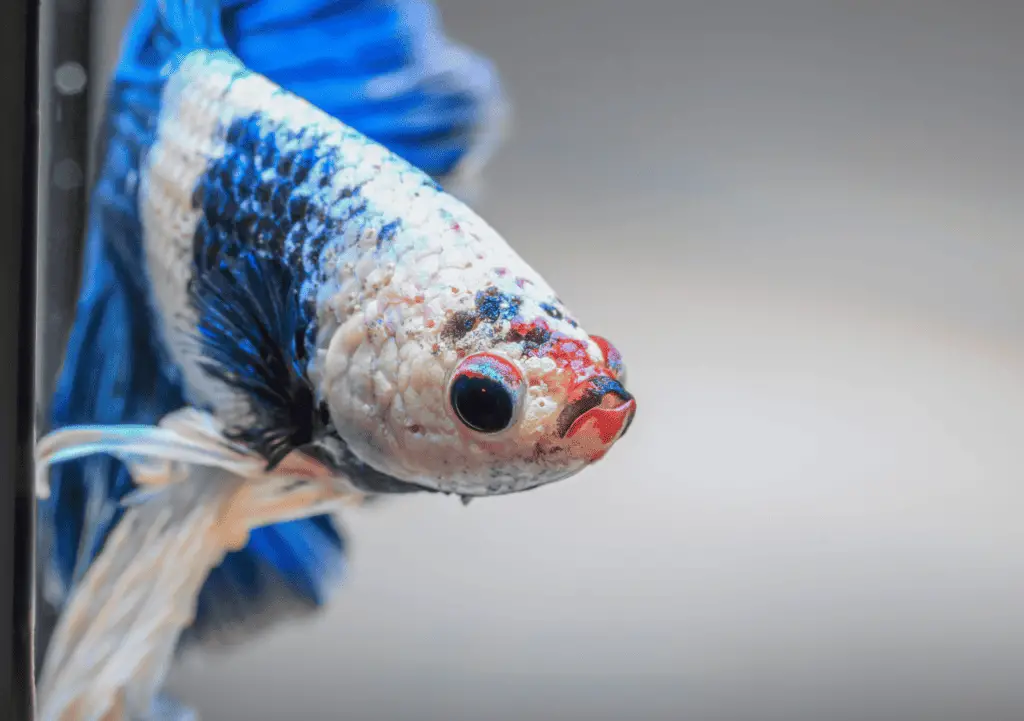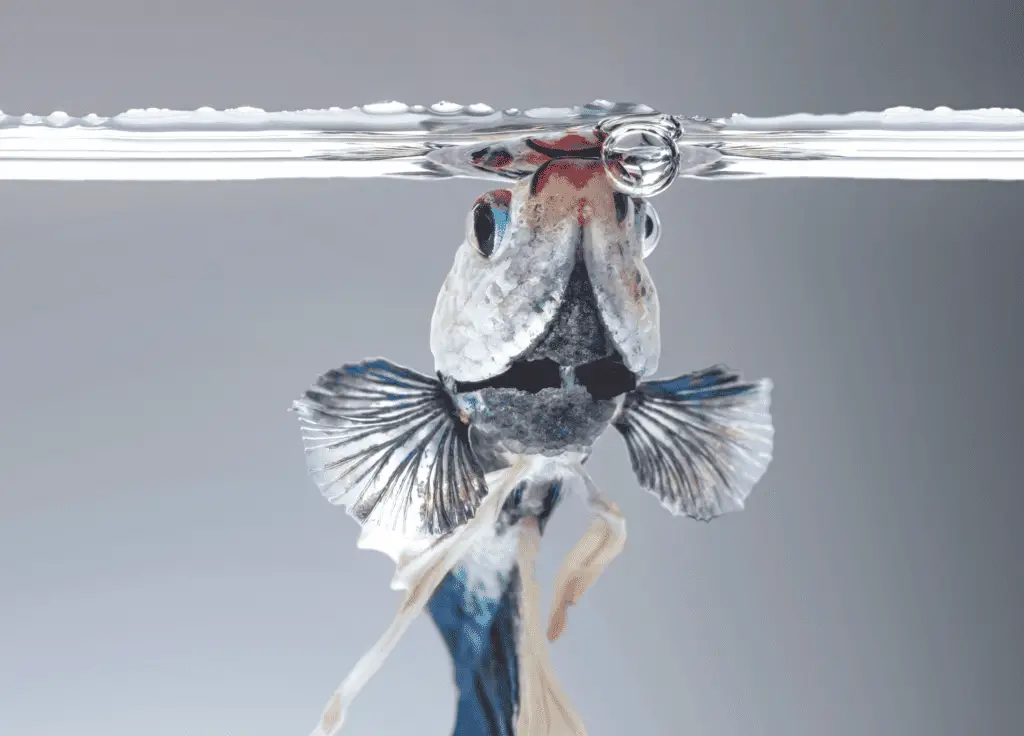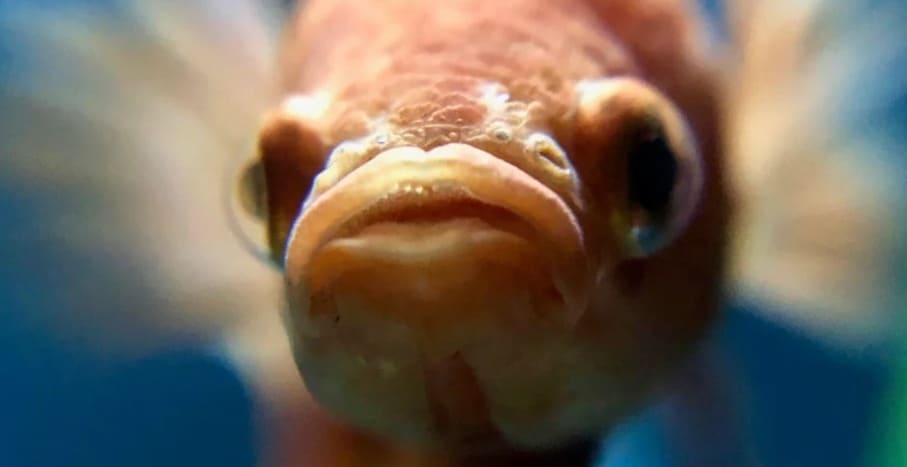Bettas are known for their bright colors and usually large, flowing fins. They can also be found in a variety of shapes and sizes. But what is less well-known about these fish is how they eat.
One question that often arises from those who own or care for bettas is “do bettas have teeth?” To answer this question we need to understand the anatomy of the mouth and jaws of a betta fish. Let’s jump in!
Do Bettas Have Teeth?
Yes, betta fish have small, white teeth that are used for gripping prey. The teeth are located in both the upper and lower jaw, which are helpful for catching food as it passes by.
When you see how betta fish rip their food apart, it can be easy to understand how they have teeth. As carnivores, they wouldn’t be able to catch and eat prey without these sharp teeth.

What Do Bettas Use Their Teeth For?
There are two ways that betta fish use their teeth:
Feeding
Bettas use their teeth for snapping up small insects and invertebrates when hunting. Because their prey is usually quite small, they need all the help they can get to catch it. The teeth grip the prey and keep it in place while the fish’s powerful jaw muscles clamp down and swallow it whole.
In captivity, these teeth are used for biting down on pellets or flakes that are offered as food. This helps the betta to break the food up into smaller pieces before swallowing, making it easier for them to eat.
Fighting
In addition to helping them catch prey, betta fish use their teeth for fighting. When two males are competing for territory or a mate, they will often bite each other on the body or fins. This can cause serious damage and even death if the fight goes too far.
In fact, you may have heard bettas being described as Japanese fighting fish. This is because these fish have been bred for their aggressive nature and ability to fight.
As such, two males should never be kept together in the same tank. You can use a divided betta tank if you have an aggressive betta that is starting to bite other fish. This will allow you to keep the fish separate without having to rehome them completely.
Does Betta Fish Bite Hurt?
Betta fish have a strong bite that hurts if they manage to clamp down on your finger. This is because their teeth are sharp and can easily pierce the skin.
While they may not be able to take down a full-grown animal, their bite is still quite powerful and should not be underestimated. It’s always important to be careful when handling bettas, especially if there are males in the tank that are feeling territorial.
Why Is My Betta Biting Me?
There are a few reasons why your betta fish might be biting you, but it’s mainly due to curiosity, defending territory, and accidents. Oh, and a bite doesn’t mean that your betta doesn’t love you!

Curiosity
When a betta fish bites you, it’s often just due to curiosity. Bettas are naturally curious animals and their inquisitive nature can cause them to investigate anything that stands out from the background of the tank.
Defending Territory
Another reason why a betta might bite you is if it’s defending its territory. As we mentioned earlier, bettas are quite territorial and will fight for what they believe is their own.
Bettas are especially territorial when guarding a mate or egg clutch, but even if you’ve just introduced new fish into the tank your betta might be on guard to defend his home.
Many owners have reported being bitten by their bettas when they reach into the tank to clean it or adjust the decorations. This is because the betta sees your hand as an intruder and tries to bite it in order to scare it away.
Accidents
Finally, an accidental bite can occur if it’s feeding time and you get too close to the tank. Bettas tend to be quite aggressive when it comes to food, and they will often lash out at their owner’s hands in an attempt to catch a snack.
This doesn’t necessarily mean that your betta is trying to bite you; rather, it just means that he thinks you’re offering him food and wants some!
How Can I Stop My Betta Fish From Biting?
If you want to stop your betta fish from biting, then the best thing is to understand why he’s doing it in the first place. As we’ve mentioned above, there are a few reasons for this behavior and each one will require something slightly different. If you do a bit of research into your betta’s personality and behavior, you’ll be able to better deal with any biting issues.
If your betta is biting due to curiosity, then you can try to increase the amount of stimulation in the tank. This will keep your betta busy and stop him from having to bite your finger. If you’re using live plants, then try moving them around every once in a while so that your betta has something different to explore.
- 1 piece resin Cave Rock (4x4.6 inch)
- 6 pieces plastic plants in different colors and sizes (2.36 ~ 8 inch)
- The plastic aquarium plants are soft and no sharp edges, it won't hurt your fish. The fish tank plants will neither fade nor create pollution to the water, which will provide a comfortable and clean living environment for the fish.
- The rock adds natural environment to your aquarium landscaping. Made of resin, realistic texture, no smell and safe for freshwater and saltwater environments.
- The aquarium aquatic fish tank decorations are easy to use, just soak in water for 10-15 minutes before use, and then put in the fish tank to make a nice arrangement according to your creativity and imagination, provide a comfy and interesting environment for your fishes
If your betta is biting due to defending territory or being territorial when feeding time comes around, then the best way of dealing with this behavior is simply not to trigger it. While you can’t always stop your betta from feeding, you can make sure that he doesn’t see your hand as a threat by keeping it out of sight when possible.
Nothing can stop biting accidents, so the best thing to do is just reduce the amount of time you have your hand in the water.
Biting isn’t a huge problem for most bettas, but it can be very annoying if you’re trying to interact with them or just clean the tank! It doesn’t hurt too much, but it’s still best to be careful.
Do Betta Fish Bite During Spawning?
Yes, betta fish can bite each other during spawning. They aren’t the best lovers, but they still have their own complex mating rituals, which usually involve biting.
Mating – Gentle biting during mating is to be expected. In fact, it can be a good sign if the fish getting bitten doesn’t seem to mind. This means that the fish is getting ready to mate.
Fighting – On the other hand, if there is no mating behavior to be seen and the fish are fighting, then it’s time for you to get involved. Separate the bettas immediately! You can use a divided betta tank to do this.

The Anatomy of Betta Teeth
Betta fish teeth are small, sharp, and predominantly white. They are not visible to the naked eye, given their tiny size. Betta fish teeth are located on both the upper and lower jaws and are used primarily for gripping and tearing apart their prey. Unlike human teeth, which vary in shape and size according to their specific roles, all betta fish teeth are similar in form, essentially designed for the same purpose. They resemble tiny needles and are optimized to catch small, slippery prey, making them efficient tools in both hunting and feeding.
How Betta Fish Develop Teeth
Like many other species of fish, bettas begin to develop their teeth while still in the egg. By the time they hatch, the basics of their dental structure are in place, though not yet fully formed. As the betta fish grow and start consuming more complex food, their teeth will further develop and harden to allow for effective feeding.
Bettas do not undergo a tooth-shedding process like mammals do. Instead, their teeth continue to grow throughout their lives. This continual growth helps compensate for the wear and tear their teeth experience from their diet.
Care Tips for Betta Teeth Health
Maintaining your betta fish’s teeth health is less about direct dental care and more about ensuring overall health and providing a suitable environment. Here are some tips:
- Diet: Provide a varied diet that mimics what a betta would eat in the wild, such as brine shrimp, bloodworms, and daphnia. This will help keep their teeth strong and healthy.
- Water Quality: Maintain good water quality in your aquarium. Poor water conditions can lead to various health issues, including ones that could affect your betta’s mouth and teeth.
- Avoid Overfeeding: Overfeeding can lead to obesity and other health issues in betta fish. It can also pollute the water, leading to poor living conditions.
Common Teeth-Related Problems in Betta Fish
While betta fish do not commonly suffer from teeth-specific issues, their teeth can be affected indirectly by general health problems. For instance, if a betta fish suffers from malnutrition, this can potentially lead to weakening of their teeth.
One common ailment is mouth rot or cotton mouth disease, a bacterial infection that can affect the mouth area. It is caused by poor water conditions or stress, leading to symptoms like loss of appetite, redness around the mouth, and frayed, decaying fins.
If your betta seems to have trouble eating or shows signs of mouth disease, it’s best to consult with a vet or a fish health professional to diagnose the issue accurately and determine an appropriate treatment. Remember that prevention is the best cure; maintaining good water conditions and a balanced diet is crucial to avoid such problems.
Betta Fish Teeth vs. Other Fish
Comparing betta fish teeth to those of other popular aquarium fish can provide some interesting insights.
Guppies, like bettas, are also tooth-bearers, but their teeth are located in their throats rather than their mouths. They have pharyngeal teeth, used primarily for crushing and grinding food before it enters the digestive system.
Goldfish, on the other hand, have no teeth in their mouths, but possess pharyngeal teeth in their throat similar to guppies. They use these teeth to break down their food before swallowing.
Cichlids, another popular aquarium fish species, also have teeth, but the type and number greatly vary depending on their diet and species. Some have sharp, pointed teeth for gripping prey, while others have flat, molar-like teeth for grinding plant matter.
In contrast, bettas have their teeth directly in their jaws. They are designed for a carnivorous diet, to grip and tear at food. This makes them uniquely adapted among common aquarium fish.
Betta Fish Teeth: Myths vs. Facts
In the world of pet care, betta fish teeth are often the subject of some myths and misconceptions. Here are a few common ones, debunked:
Myth 1: Bettas’ teeth are large enough to be seen with the naked eye.
Fact: Betta teeth are actually very small and not easily visible without magnification.
Myth 2: Betta fish bites can harm humans.
Fact: Although betta fish do have teeth, their bite is unlikely to harm humans significantly. The teeth are designed to grip small invertebrates, not to penetrate human skin. While a bite might feel like a small pinch and may surprise you, it won’t cause serious injury.
Myth 3: Bettas lose and replace their teeth like sharks.
Fact: Unlike sharks, betta fish don’t shed and replace their teeth. Instead, their teeth continue to grow throughout their lifetime to compensate for any wear and tear.
Myth 4: Betta fish teeth need cleaning.
Fact: Bettas do not require any form of dental care like humans or certain pets do. Instead, maintaining a healthy, balanced diet and good water quality indirectly ensures their dental health.
Dispelling these myths can help ensure your betta fish gets the right care, and helps you understand your aquatic friend’s behavior and needs even better.
Conclusion
In conclusion, betta fish have teeth that they use to bite for several reasons. While it’s not a common occurrence, it’s still best to be aware of the possibilities and take steps to prevent your betta from biting.
Now that you know a bit more about betta fish teeth, you can see how they play an important role in their everyday lives. Not only do they help with feeding, but they can also be used in fights to defend territory or mates.
I hope that you found this article useful and that it will help you understand your betta fish a little better!
Frequently Asked Questions About Betta Fish Teeth
1. Can you see betta fish teeth?
Due to their tiny size, betta fish teeth are not easily visible to the naked eye. You would likely need magnification to spot them.
2. Can betta fish bite humans?
Yes, betta fish can bite humans, but their bite usually feels like a tiny pinch and won’t cause significant harm. It’s more surprising than painful.
3. How can I prevent my betta from biting me?
Bettas usually bite out of curiosity or defense. Keeping your hands out of the tank as much as possible, providing a stimulating environment, and avoiding disturbing the fish during feeding times can help reduce the chances of biting.
4. Can a betta fish’s teeth grow back if lost?
Betta fish teeth continually grow throughout their lives, compensating for any natural wear and tear. While they do not shed and regrow teeth like some animals, their teeth will replenish over time if any damage occurs.
5. Do betta fish have baby teeth and adult teeth like humans?
No, betta fish don’t have different sets of teeth like humans. They start to develop their teeth while still in the egg, and these teeth grow and harden as the fish matures.
6. What are some signs of teeth or mouth problems in my betta fish?
Signs may include a loss of appetite, difficulty eating, and changes in behavior. If your betta shows any of these signs or any visible signs of distress around the mouth area, it may be suffering from a mouth or teeth-related health problem.
7. What should I do if my betta fish has a mouth or teeth problem?
Consult with a vet or a fish health professional for accurate diagnosis and appropriate treatment. It’s crucial to maintain a healthy environment and diet for your betta fish to prevent such problems from arising.
8. Do female betta fish also have teeth?
Yes, both male and female betta fish have teeth. They use these teeth primarily for feeding.
9. Are betta fish teeth sharp?
Yes, betta fish teeth are sharp. They are shaped like small needles, optimized to catch and hold onto small, slippery prey.
10. What do betta fish use their teeth for?
Betta fish use their teeth primarily for feeding. The teeth help them grip and tear apart their prey. They may also use their teeth in fights, usually during disputes over territory.







